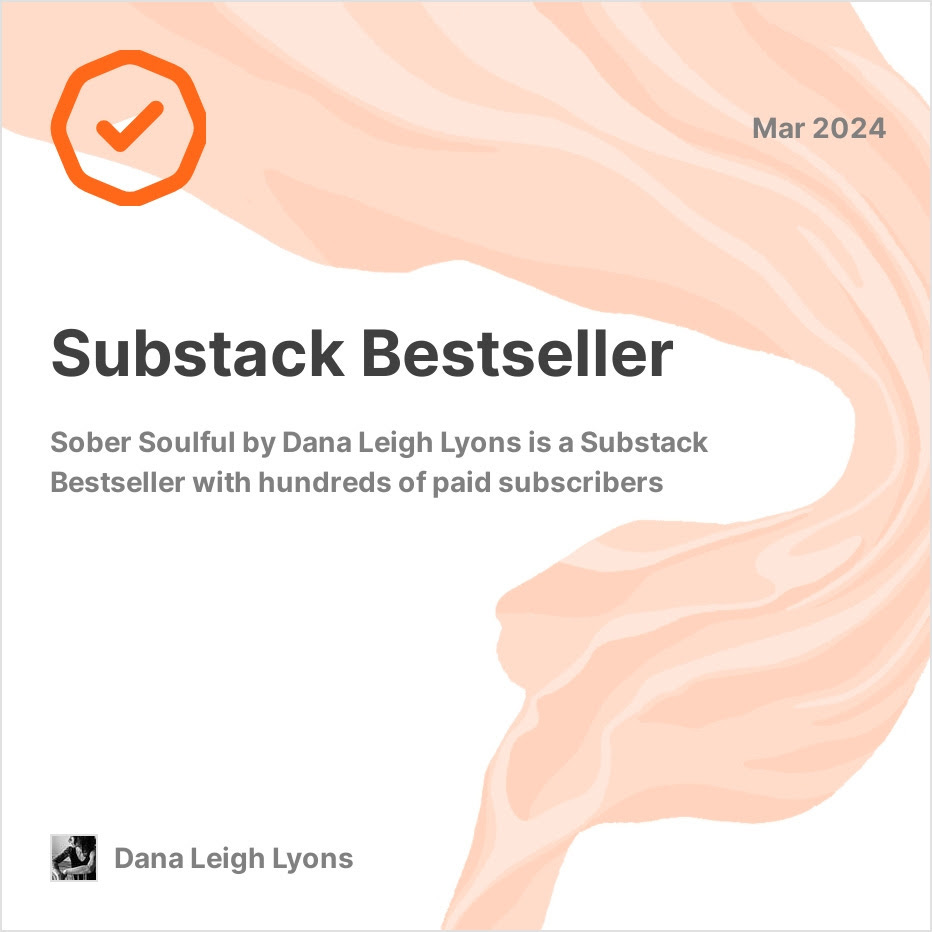As regular readers know, I end every essay with an invitation and request: “I’d love for you to share in the comments. Please just keep it about you and your experience—no unsolicited advice, please.”
This request aligns with standard practice in addiction recovery groups. It’s also an essential aspect of conscious, emotionally intelligent communication and healthy interpersonal boundaries.
And yet.
As Sober Soulful grows, it’s becoming more common for someone to swing by, ignore this request, and proceed to do the exact thing I’ve asked them not to do: tell me what I should do with my life, my recovery, my problems. (Maybe you’ve seen something similar in your comment sections? I’d love to hear how you approach this, but more on that later.)
Usually, the person doing this is not a subscriber or even a regular reader. They offer their unsolicited advice after reading one essay (or, let’s be real, part of one essay).
Which brings us to last week’s uncomfortable incident.
My most recent essay was all about hate comments—how and why I feel compelled to read them, how and why I’m shifting this habit.
The vast majority of the comments were what I’ve come to expect from this beautiful community: folks shared personal, heart-sourced experiences and offered kindness and support without offering unsolicited advice.
BUT, as is becoming the norm, there were a few readers who didn’t appear to have read the full essay and used the comments as a platform for sharing advice and opinions directed at me and/or the wider collective.
Rather than call them out directly, I attempted a subtle redirect, responding: “Thank you for sharing. I’d love to hear what this looks like for you, in your life and experience.”
THIS DID NOT WORK.
(In the moment I was enraged, but now I have to laugh: subtlety clearly isn’t the strong suit of non-reading, non-listening people with a preset agenda.)
Not only didn’t it work, but one person responded with a lengthy sermon full of more unsolicited advice. And so, I tried again—this time with an approach that was still soft but more direct: “Thank you for sharing. A gentle reminder that I request at the end of every essay: Just please keep your shares about you and your experience. No unsolicited advice, please.”
That approach didn’t go as planned either. Instead, it was as though I’d unwittingly poured gasoline on a fire. Her reaction was swift, angry, accusatory, and crazy making.
Intention doesn’t excuse impact.
Although I was genuinely surprised (and shaken) at how things took a turn in the comment section, I also realize that a person offering unsolicited advice rarely thinks they’re doing anything wrong. They may even describe themselves as a giver, an empath, a caretaker, etc.
It’s just that, even if they don’t realize it, “giving” from this place often has a lot to do with feeding their own sense of identity and meeting their own needs. (If they were primarily interested in helping the other person, they would listen to the other person and honor their request to not offer unsolicited advice.)
Still, let’s offer them the benefit of the doubt and assume their intentions are well meaning: They want to help. They’re certain they have the answer. They’re determined to tell it to you and anyone else who will listen. Thing is…
If the impact is harmful, it’s still harmful. Good intentions don’t excuse the impact of our actions. Taking honest, direct accountability for our actions and impact is part of what senior Buddhist teacher and author Norman Fischer calls “truly growing up.”1
Why offering unsolicited advice may not be helpful
Look, we’re all human here. All of us—unsolicited advice givers included—are trying to feel seen, safe, and as though we belong. My heart goes out to everyone navigating this human realm generally and the hyper-online aspect specifically.
It’s just that how we offer advice matters as much if not more than the content. It also has a huge impact on whether advice is heard and received.
For me personally, this is something I’ve had to learn and am still learning. I didn’t pop out of the womb knowing that offering unsolicited advice is inflictive. It’s an ongoing practice in awareness and translating that awareness to action.
In case you’re working through this too (or want some suggestions of how to articulate it to others), here are a few reasons why offering unsolicited advice may not be helpful:
Like me, many of my readers are in recovery. It’s standard practice in recovery groups (and group therapy, for that matter) to not offer unsolicited advice. For one thing, we don’t always know best. We also don’t know everything about the other person—not their history or what they’re dealing with currently, not what they’ve already tried or are currently doing. Even if we do know lots about someone, what helps us may not be the thing that helps them. Plus, unless they invite our commentary about their personal situation, it’s simply not our business to offer it. Doing so may hurt rather than help their healing.
People who don’t consider themselves in recovery are often just as addicted to their role as the giver, the caretaker, the empath, the savior, etc. Those folks have a tendency to “other” the identified patient or addict. That’s bullshit, and it hurts rather than supports the other person’s recovery. It’s also a subconscious way of deflecting from The Helper’s own addictions and harmful patterns.
Beyond recovery circles, presuming to know what someone else (especially a stranger) needs and when they need it is arrogant, condescending, and demeaning. Not everyone wants or needs our advice! Even if they do want it eventually, they may not want it right now for a million valid reasons. It can be easy to wrongly assume we all have the same story and are on the same chapter. In the vast majority of cases, we are not.
Even if we have loads in common, many of us are already engaged in practices that support helpful change. We may even be taking in more advice than we can possibly process and integrate. More advice—no matter how wise—is not always helpful and might even be harmful. It’s up to each person—not the self-appointed advice giver—to decide what they need.
At the end of the day, it comes down to respecting others as our equals, human to human, heart to heart. It also comes down to making it safe for others to share honestly and vulnerably.
In my own life—online and off—if I’m unsure whether someone wants advice, I’ll ask them: Would you like my advice, or do you want me to just listen right now? How can I best support you?
And if I’m reading something online, I never offer advice unless the person has explicitly asked. (And I read every single word of an essay to make sure before offering.)
There are many, many ways to support people. Shouting our opinions at them and hijacking their platform in the guise of “advice giving” is not one of them.
And now, after all that, I’m soliciting your advice!
Look, I treasure this community with my whole heart. The last thing I want is to turn into the Comment Police, but my attempts to gently redirect and remind don’t seem to be working.
So, this is the new strategy I’m considering: just letting their comments sit there.
No hearts. No replies. No acknowledgement or engagement. Just leaving them be and letting them “speak” for themselves.
Does this sound wise to you? What would you do if you were me and readers ignored your request to not offer unsolicited advice?
As a member of this community of subscribers and readers, what feels safest to you? What can I do to help you feel safe sharing openly and vulnerably?
I’d also love to know how you respond when receiving unsolicited advice.
Do you attempt a gentle redirect? If that doesn’t work, do you get more assertive?
Is this easier or harder depending on whether the unsolicited advice comes from strangers, friends, or family members? How about online or off?
Even when I don’t ask for advice, I always learn from you. Thank you for being here.
And before you go, please tap the little ♡. It offers “social proof” and lets others know there’s something useful here. The more people become paying subscribers, the more time I can devote to Sober Soulful, which I consider my most magical, most meaningful work.
Thank you. I appreciate you. I love you.
Dana
My dear friend Steve helped me understand this distinction between intention and impact. He also offered wise, clear articulation of what was happening in the essay comment section.
Taking Our Places: The Buddhist Path to Truly Growing Up, by Norman Fischer. That’s an affiliate link for Bookshop.org, where I curate lists of my favourite reads and may earn a small commission if you make a purchase.












I’m in favor of just leaving an unappealing comment sit in full view, without answering it and putting gas on the fire or deleting it and making an enemy. But sometimes you just can’t let it go. It feels like I MUST do something!
Here’s my advice, that I’ve used in my own online life for years now to diffuse haters.
When I make myself use it, it has worked most times to make me feel better and clip their comment wings.
I read the crude, rude comment and then carefully reply “Thank you for your comment! You’ve given me a lot to think about, and I really appreciate it.”
That’s it. Don’t poke the bear. It’s not even a lie, because these comments do give us a chance to consolidate, reexamine, affirm, validate, improve.
Oh boy. Isn't this a fun topic? A few things come to mind for this one …
First, my Guiding Teacher stresses the importance of not meddling in others' lives generally, especially not in their spiritual lives, unless invited by them. Even then, she says, proceed with utmost caution. You can do a lot of damage when stepping into someone's business.
This is the case even when we know someone well, say a close friend. Perhaps it is especially the case then. The intimate connection supports a feeling that we can offer specific, direct advice to them and that we are permitted to do so! Yet, even with close friends, how well do we know them? As close as my partner and I are, I have no clue what her "inner life" is like. It seems that Thich Nhat Hanh's encouragement to ask, "Are you sure?" has broad applicability.
Second, I'm glad that almost no one comments on my writing. I need only deal with my headaches!
Third, I touch on some of these themes in next week's offering on Step Ten and Equanimity.
Thank you for your thoughts, Dana. Happy Caturday.